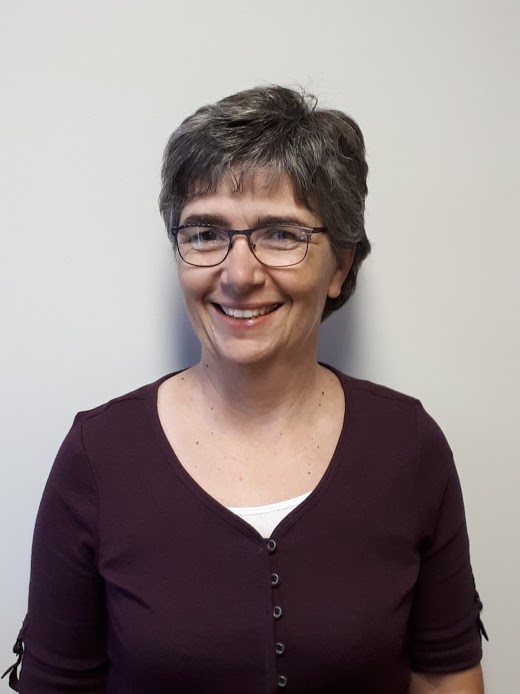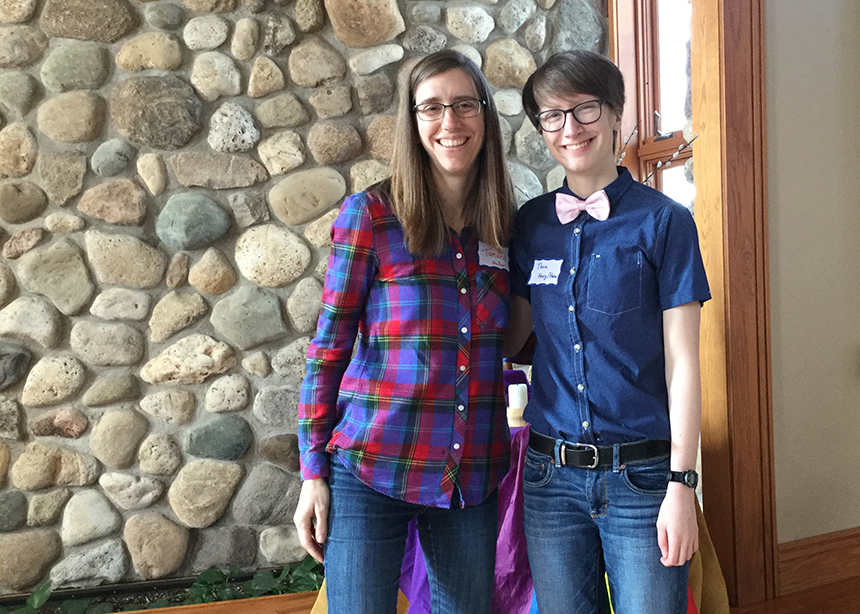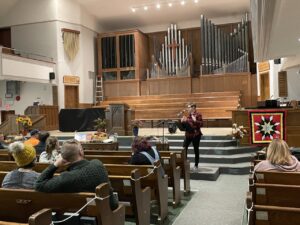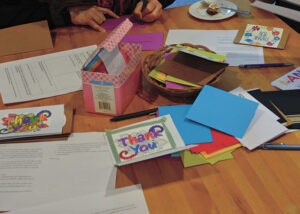The gathering hymn, “God Welcomes All,” called some 120 people to worship at the opening of the “Beyond binaries: Creating an affirming church” event hosted by Waterloo North Mennonite Church on April 6.
The vision for this event came from 17-year-old Thea Andres, who identified the treatment of queer people—a term being reclaimed by many in the LGBTQ+ community to describe themselves—as a problem. Andres partnered with Tamara Shantz of Pastors in Exile (PiE) to shape and lead “Beyond binaries” as a way to address it.
Alluding to Paul’s description of the church in I Corinthians as “the body of Christ,” Shantz said, “the body of Christ is queer and quirky, and profoundly worthy of wonder.” She said that people of all genders are created in the image of God, are beloved of God and are essential parts of the body of Christ.
After worship, Andres presented “LGBTQ+ 101”—an opportunity to learn terminology and clear up misunderstandings. Andres described four major aspects of an individual’s identity:
– Biological sex: assigned at birth based on genitalia, hormones and chromosomes.
– Gender: one’s internal sense of identity.
– Attraction: who one feels attracted to sexually or romantically.
– Presentation: gender expression through clothing, hair, make-up, chosen pronouns.
Andres emphasized that, for some people, biological sex and gender identity don’t match, and sometimes they don’t fit into the binary categories of male and female. This can be difficult because these categories are loaded with cultural expectations.

Andres and Shantz, along with Peter Haresnape and Grace Gibney, formed a panel to share, with vulnerability and honesty, their stories of welcome and affirmation, their challenges and barriers, and what they want their straight allies to understand.
Haresnape described how, after his marriage at city hall to his husband, it was “immensely meaningful” to have members of his church help to create a service of celebration, “blessing us and praying for us and coming around us” in a powerful experience of welcome.
Panellists noted how important it was to have safe spaces like Generous Space Ministries and PiE’s Queerly Christian “to embrace that part of myself.” They also addressed Mennonite Church Canada’s decision, in the Being a Faithful Church (BFC) process, to leave space for congregations to make different decisions about LGBTQ+ inclusion.
Andres said, “Taking a neutral stance is actually an oppressive stance,” because it leaves room for people to say hurtful and harmful things.
Shantz described being part of the BFC conversation as an incredibly “hard process,” because “your community is still deciding whether it’s okay if you are there or not, and you are already there . . . so it’s creating an ‘us’ and ‘them.’ ” She noted how heartened she was when someone in her church spoke up and asked, “Isn’t it ‘we’? Aren’t ‘we’ a community of diverse orientations?”
All of the panellists emphasized that it isn’t enough for a church to create an affirming statement of LGBTQ+ inclusion. More needs to be done to embody what that means.
Gibney challenged people to examine their own privilege, and to educate themselves. She said it is exhausting for people in the marginalized community to take all the responsibility to be the educators.
Shantz described such learning as an “intercultural conversation.” People who are formed in “heteronormative patterns” need to take on a posture of learning about queer culture just like they would seek to learn about a new immigrant community.
Workshops in the afternoon featured more powerful storytelling and ideas about how to dismantle barriers so that all can fully participate in churches. Suggestions included:
– Singing hymns that reflect and celebrate a diversity of genders.
– Varying language and descriptions of God.
– Interpreting Scripture and doing theology from a queer perspective.
– Displaying rainbow signs, flags and colours.
– Printing and verbalizing welcoming statements regularly.
– Wearing name tags that include a rainbow symbol and preferred pronouns.
– Making it clear on a church website if the congregation is welcoming or not.
– Noting events in the queer community in church announcements.
– Blessing and celebrating marriages of all genders.
To end the day, participants were asked to post lessons learned, perspective shifts and next steps on charts on the wall. Another action taken was to connect people interested in discussing how affirming churches could offer each other and the LGBTQ+ community more resources and support.
Further reading:
Creating space to work towards inclusion
Searching for a ‘generous space’








Leave a Reply
You must be logged in to post a comment.